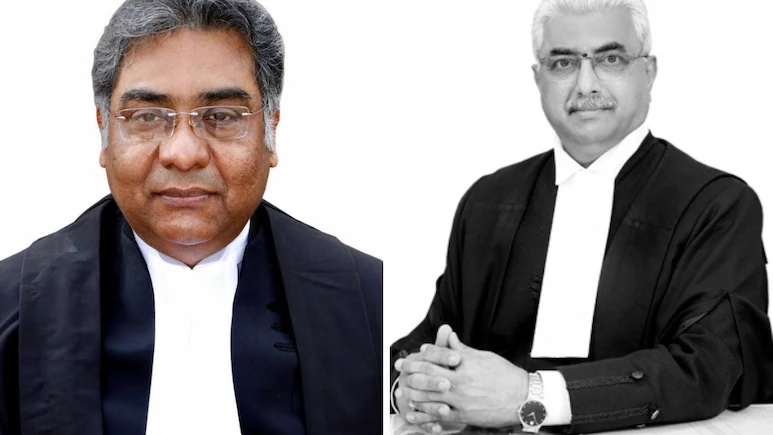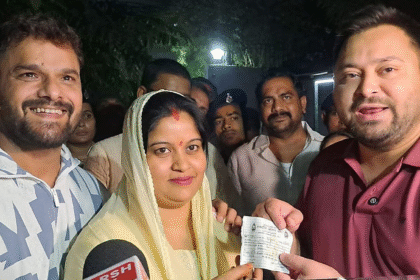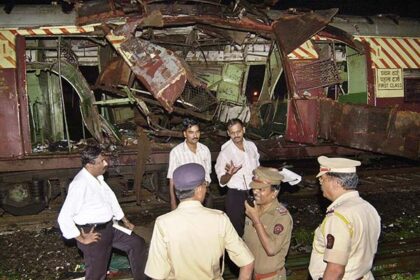The Three-Judge Panel Probing Justice Yashwant Varma: A Deep Dive into the Case, the Judges, and the Judicial Climate in India
The Indian judiciary, celebrated for its independence and regarded as the last line of defense for constitutional rights, has recently found itself under intense scrutiny. The trigger for this wave of public and institutional attention is the high-profile inquiry into allegations involving Justice Yashwant Varma, a sitting judge, in what has been described as a “cash-for-favor” controversy.
The matter, shrouded in legal complexity and political sensitivity, has raised significant questions about judicial accountability, ethics, and the mechanisms through which the judiciary polices itself. Central to this unfolding legal drama is a specially constituted three-member panel tasked with investigating the allegations against Justice Varma. This panel comprises Supreme Court Justice Aravind Kumar, Madras High Court Chief Justice MM Shrivastava, and senior jurist BV Acharya.
This article begins a comprehensive, multi-part exploration of the case. Over the course of several detailed sections, we will examine the background of the accused judge, the role and credentials of each panel member, the legal processes at play, the historical precedents of judicial inquiries in India, the implications for public trust in the judiciary, and the broader reforms the case may inspire.
Background of the Case
Justice Yashwant Varma, known for his tenure in the Allahabad High Court before moving to the Delhi High Court, has had a career that, until now, had not been publicly marred by controversy. The allegations in question revolve around claims that financial transactions—improper in nature—were linked to judicial decisions or case outcomes.
While the exact details remain confidential as per the in-camera nature of such inquiries, media reports suggest that the controversy may involve large cash sums and potentially influential litigants or business entities. The fact that the Supreme Court itself has sanctioned an inquiry reflects both the seriousness of the allegations and the judiciary’s intent to uphold internal discipline.
Constitution of the Three-Member Panel
The appointment of the three-member inquiry committee is not merely a procedural formality but a statement in itself. By selecting a mix of current high-ranking judicial figures and an experienced senior advocate, the Supreme Court has signaled its commitment to transparency and thoroughness.
- Justice Aravind Kumar — A sitting judge of the Supreme Court with a reputation for incisive legal reasoning, particularly in constitutional and commercial matters. His tenure has been marked by a series of landmark judgments, and he is widely respected for his no-nonsense approach in court.
- Chief Justice MM Shrivastava — The Chief Justice of the Madras High Court, he brings decades of experience from the trial courts to the highest rungs of the judiciary. His administrative skills, honed through complex case management in one of India’s busiest high courts, make him a vital member of the panel.
- BV Acharya — A senior advocate of impeccable standing, BV Acharya is known for his role in several high-profile corruption cases and his deep understanding of criminal jurisprudence. His presence ensures that the panel benefits from a seasoned practitioner’s perspective, balancing the viewpoints of sitting judges.
Mandate of the Panel
The panel’s task is to investigate the facts, assess the credibility of the allegations, and determine whether the conduct of Justice Varma breached judicial ethics or constituted corruption under Indian law. Their inquiry will likely involve:
- Reviewing case files and orders linked to the allegations.
- Examining financial records and communication trails.
- Recording testimonies from key witnesses.
- Ensuring the confidentiality of proceedings while maintaining procedural fairness.
Given the sensitivity, the inquiry will be conducted behind closed doors, but its findings—at least in summary form—are expected to be made public.
Judicial Accountability in India: A Delicate Balance
The inquiry into Justice Varma is a stark reminder of the tightrope walk between judicial independence and accountability. The Indian Constitution grants judges significant protections, including removal only by a parliamentary process in cases of proven misconduct. However, internal inquiries like this one serve as crucial mechanisms to address issues before they reach the threshold of impeachment.
Historically, cases involving allegations against sitting judges have been rare but not unprecedented. The challenge lies in ensuring that such inquiries are both thorough and fair, avoiding any perception of bias or political interference.
Public and Media Reaction
The media’s interest in the case has been intense, with news outlets offering continuous coverage and analysis. Public opinion, however, is sharply divided. While some view the inquiry as evidence of the judiciary’s willingness to self-correct, others worry about the potential damage to the institution’s image.
The balance between transparency and the need to protect the dignity of the judiciary will be a defining factor in how this case unfolds in the public eye.
When a case involves the potential misconduct of a sitting High Court judge, the selection of an inquiry panel is not merely a procedural formality—it is a reflection of the judiciary’s own self-awareness. The names chosen speak volumes about the credibility, impartiality, and seriousness with which the matter is being approached.
In the probe into Justice Yashwant Varma’s alleged involvement in a cash-for-favor controversy, the Supreme Court has appointed three individuals whose careers span decades, whose reputations are rooted in both judicial wisdom and moral integrity, and whose combined expertise covers the full spectrum of constitutional, criminal, and administrative law.
This part examines who they are, what they stand for, and why they were chosen.
Justice Aravind Kumar — The Analytical Strategist
Justice Aravind Kumar is widely recognized for his razor-sharp legal mind and methodical approach to complex constitutional questions. Born in Karnataka and educated in law from Bangalore University, he began his career as an advocate specializing in civil, constitutional, and corporate litigation before being appointed as a judge of the Karnataka High Court in 2009.
His judgments are known for their precision and clarity, with a focus on balancing procedural law and substantive justice. Before his elevation to the Supreme Court in 2023, Justice Kumar served as Chief Justice of the Gujarat High Court, where he introduced several reforms in court digitization and case-flow management.
Key Traits Relevant to the Panel:
- Uncompromising approach to judicial ethics.
- Strong understanding of commercial and white-collar crime law, useful in probing financial allegations.
- History of dissent opinions in cases involving state overreach, which shows independence of thought.
Notable Judgments:
- A ruling reinforcing the independence of Lokayuktas from state government interference.
- A landmark decision on corporate liability in environmental violations.
Chief Justice MM Shrivastava — The Administrative Reformer
At the helm of the Madras High Court, Chief Justice MM Shrivastava has earned a reputation as a no-nonsense administrator and a champion of judicial efficiency. His career began in the Madhya Pradesh judiciary, and over time, he gained recognition for tackling sensitive criminal cases involving political figures.
CJ Shrivastava’s leadership in one of India’s oldest and most complex high courts has been marked by an insistence on punctuality, docket discipline, and the swift disposal of long-pending matters. These qualities make him a natural fit for a fact-finding panel that will need to balance speed with meticulousness.
Key Traits Relevant to the Panel:
- Proven ability to manage high-stakes cases without public spectacle.
- Known for maintaining strict confidentiality in sensitive proceedings.
- Adept at interpreting procedural rules to ensure due process.
Notable Judgments:
- High-profile rulings in custodial death cases, emphasizing state accountability.
- Judgments tightening procedural safeguards in corruption trials.
BV Acharya — The Veteran Advocate
BV Acharya’s inclusion in the panel offers an external yet deeply informed perspective. As a senior advocate with a career spanning over four decades, Acharya has handled some of the most politically sensitive and legally intricate cases in modern Indian history.
His role in the prosecution of former Tamil Nadu Chief Minister J. Jayalalithaa in the disproportionate assets case is a testament to his persistence and integrity. Known for his thorough preparation, Acharya combines a prosecutor’s skepticism with a scholar’s respect for evidence.
Key Traits Relevant to the Panel:
- Deep familiarity with corruption laws and their practical enforcement.
- Ability to spot weaknesses in testimony and documentation.
- Brings a non-judicial, real-world perspective to the panel’s deliberations.
Notable Legal Work:
- Special Public Prosecutor in several corruption cases involving high-profile politicians.
- Legal advisor on reforms to strengthen India’s Prevention of Corruption Act.
Why These Three? The Strategic Mix
The decision to blend two sitting judges—one from the Supreme Court, another from a major High Court—with an experienced senior advocate appears intentional. This combination ensures:
- Judicial Gravitas — Through Justice Kumar and CJ Shrivastava.
- Practical Legal Insight — Through BV Acharya’s prosecutorial background.
- Administrative Competence — Essential for managing the inquiry’s procedural flow.
This mix also balances perspectives—judicial insiders understand institutional pressures, while the outsider can question assumptions without the weight of collegiality.
A Look Back: Similar Judicial Inquiries in India
The panel’s structure is reminiscent of past inquiries into allegations against sitting judges:
- Justice Soumitra Sen Case (2011) — Investigated for misappropriation of funds while serving as a court-appointed receiver.
- Justice P.D. Dinakaran Case (2010) — Accused of land-grab and corruption, which led to his resignation before impeachment.
In each instance, the choice of inquiry members influenced public confidence in the process. Here, the selection suggests the Supreme Court’s intent to leave little room for questions about bias.
Public Confidence and the Road Ahead
The formation of this panel is as much about fact-finding as it is about public perception. In an era where the judiciary’s authority is under increasing public scrutiny, the credibility of those investigating one of their own will be key to whether the eventual outcome is accepted by both legal circles and the public at large.
Any investigation into a sitting judge inevitably raises two intertwined questions: Who is this person beyond the headlines? and What in their professional history may explain the situation now under scrutiny? In the case of Justice Yashwant Varma, the answers are layered, spanning decades of legal practice, judicial service, and a body of work that has attracted both praise and criticism.
Understanding the man at the center of this controversy requires retracing his journey—from his formative years in the legal profession, through his judicial appointments, to his most impactful rulings. Only by doing so can we contextualize both his achievements and the gravity of the allegations against him.
Early Life and Education
Justice Varma was born into a family with a strong tradition of public service. His early education in Uttar Pradesh combined the rigors of academics with exposure to the value of civic duty. He pursued his law degree from a reputed national law institution, where he developed a keen interest in constitutional and administrative law.
During his university years, colleagues recall him as diligent, detail-oriented, and unusually adept at dissecting complex legal problems. Moot court records from his student days reveal a penchant for sharp cross-examination and a comfort with high-pressure advocacy—traits that would later define his courtroom demeanor.
Entry into Legal Practice
Justice Varma began his legal career as an advocate in the Allahabad High Court, one of the most storied judicial institutions in the country. His practice was diverse, covering:
- Constitutional Law — Cases challenging the validity of government policies.
- Service Law — Representing both government departments and employees in disputes over appointments, promotions, and disciplinary actions.
- Commercial Disputes — Involving contracts, corporate restructuring, and regulatory compliance.
From the outset, he developed a reputation for meticulous preparation and a courtroom style that combined calm logic with strategic argumentation. Senior advocates who worked alongside him often remarked on his ability to anticipate opposing arguments and preemptively neutralize them.
Elevation to the Bench
In 2014, Yashwant Varma was appointed as an additional judge of the Allahabad High Court. His elevation was met with general approval, with the Bar describing him as “a thinking lawyer’s judge” who was attentive to both the letter and spirit of the law.
As a judge, Varma quickly established himself as someone unafraid to deliver rulings that challenged executive authority, but also willing to side with state agencies when the law and evidence so demanded.
Notable Judgments and Legal Philosophy
Over the years, Justice Varma presided over a wide range of cases. Some of his most notable include:
- Freedom of Expression vs. Public Order
In a controversial 2017 case, Justice Varma struck down certain provisions of a state government order restricting public assemblies, holding that the restrictions were excessive and disproportionate. The judgment was widely cited as an affirmation of Article 19(1)(a) rights. - Urban Development and Environmental Safeguards
In 2019, he issued a landmark ruling halting a major real estate project until compliance with environmental clearance norms could be verified. The judgment emphasized the principle that economic development must be balanced against ecological preservation. - Service Law Reforms
Justice Varma authored a judgment streamlining disciplinary proceedings in government service, advocating for time-bound investigations to prevent prolonged uncertainty for employees.
His legal philosophy often appeared rooted in judicial minimalism—resolving the matter at hand without unnecessarily expanding the scope of interpretation—yet he was willing to issue expansive rulings when fundamental rights were at stake.
Transfer to the Delhi High Court
In early 2021, Justice Varma was transferred to the Delhi High Court. This move placed him in a jurisdiction with a heavy caseload of high-profile matters, from constitutional challenges to regulatory disputes involving large corporate entities.
Colleagues observed that in Delhi, his approach became more assertive in cases involving economic offenses, possibly due to the capital’s exposure to financial litigation. Several of his rulings during this period dealt with:
- Money laundering and PMLA procedural safeguards.
- Taxation disputes involving multinational corporations.
- Regulatory oversight of tech companies operating in India.
The Build-up to the Controversy
While the exact chain of events leading to the present allegations remains confidential due to the ongoing inquiry, certain contextual elements are relevant:
- Increased Scrutiny — His handling of several corporate and property-related cases drew heightened media and litigant attention.
- High-Value Litigation — In at least three cases in the past two years, the disputed sums exceeded ₹500 crore, making them sensitive both politically and financially.
- Alleged Links — Unverified media leaks have hinted at possible connections between litigants in some of these high-value matters and the alleged cash transactions now under investigation.
It is important to stress that these remain allegations. Until the inquiry concludes, Justice Varma enjoys the presumption of innocence—a cornerstone principle of both judicial and criminal justice.
Collegial Perception
Within judicial circles, opinions on Justice Varma are split.
- Supporters point to his track record of rigorous legal reasoning, his emphasis on fair hearing, and his refusal to bend under political pressure.
- Critics, however, have occasionally described his courtroom manner as overly strict and his decision-making as sometimes unpredictable in high-stakes cases.
The divided perception adds a layer of complexity to the panel’s task—its findings must be based on hard evidence, not on the mixed reputations that can form around any high-profile judge.
Implications of the Allegations
If proven, the allegations against Justice Varma could:
- Lead to his removal through the constitutionally mandated process.
- Damage public confidence in the judiciary’s insulation from corruption.
- Trigger demands for systemic reforms in judicial appointments and oversight.
If disproven, the case could serve as a cautionary tale about the dangers of reputational harm in the era of instantaneous media reporting.








